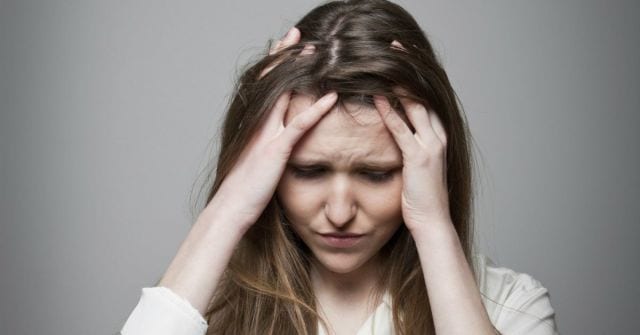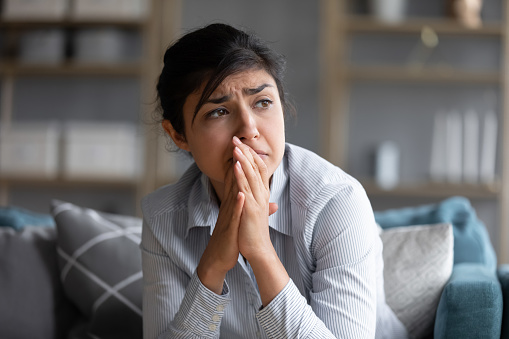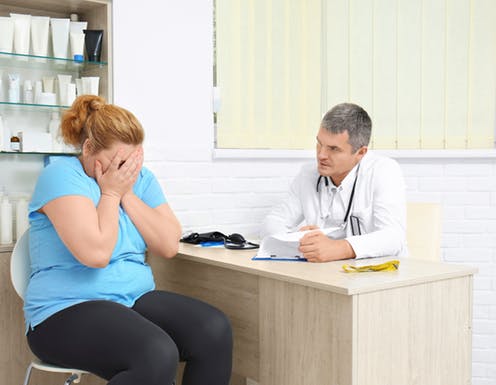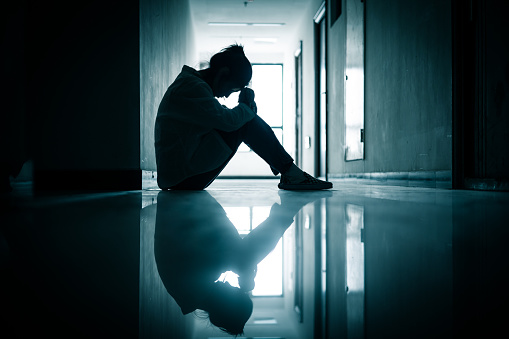
Anxiety when experienced once in a while is a normal part of life. That is why we need to know the anxiety symptoms and diagnosis for ease in management of the condition. Anxiety becomes a problem when it becomes extreme, excessive, and persistent. The fear accompanying the anxiety about everyday situations can be debilitating. Panic attacks often experienced in people with anxiety disorders can be experienced at any time sometimes even during sleep.
For people with anxiety disorders, it is always a challenge to perform daily activities. This is because panic attacks and anxiety symptoms are extreme, intense, and difficult to control. The attacks also can hit at any time with intense feelings when compared with the causative agent.
How do you know if you have anxiety? Some people may not know that they have an anxiety disorder. One of the reasons is that some anxiety disorders can start during childhood or the teenage years.
These anxieties can continue happening during adulthood. The person learns to avoid some people, places, or situations as a result.
Sometimes the cause of anxiety may not be clear. This makes the anxiety symptoms even more severe. The severity also increases because you may think that you may not get a solution for the anxiety.
Contents
Types of Anxiety Symptoms and Diagnosis
There are over 6 types of anxiety disorders. They include:
- Generalized anxiety disorders: This is an anxiety disorder where one experiences extreme anxiety for a duration of time about several activities or events. When comparing anxiety and the causal agent, the worry is excessive or out of proportion. In most instances, it is comorbid with depression or other anxiety disorders.
- Social anxiety disorder: This is extreme worry or fear about being in social situations. The person suffering from anxiety is scared of being embarrassed, ridiculed, or generally being viewed negatively by others. This makes the individual avoid sometimes in crude ways being in social situations.
- Agoraphobia: It is the fear of the fear. It is comorbid with panic disorders, depression, dysthymia, and other anxiety disorders. It occurs when one gets extreme worry and fear about being in a place or situation that one cannot escape from. The fear comes also from the worry about getting trapped, helpless, embarrassed, and without help in those situations.
- Panic disorder: Panic disorder is the excessive worry or fear episodes that are recurrent (panic attacks). The panic attacks peak within a few minutes but leave the person worried about the recurrence of the symptoms and drained. Some of the symptoms include having feelings of impending doom, nausea, shortness of breath and chest pain, increased heart rate and pounding heartbeat, excessive worry, and sweating among others.
- Separation anxiety disorder: It is an anxiety disorder where children and sometimes adults get extreme fear or worry from being detached from a person or place that they are accustomed to. The child suffering from separation anxiety disorder fears getting separated from parents or close family or their home and the level of anxiety is too excessive for the situation.
- Selective mutism: It is an anxiety disorder where a child has recurrent episodes of failure to speak in certain situations or to some people. This occurs in children who can talk and thus do not speak due to anxiety. The child can talk freely at home or to close friends or family but cannot speak to others. The child, therefore, is unable to perform well at school, in social development and when it occurs in adults they cannot perform at work.
- Specific phobias: This is an anxiety disorder where one has excessive worry or fear about some specific object or situation. It is thus accompanied by the desire to avoid the object or situation. The situations or objects when that cannot be avoided cause some individuals to develop panic attacks.
There are other anxiety disorders or associated emotional disorders that have excessive worry and fear as part of their symptoms. These anxiety-related disorders may include:
- Post-traumatic stress disorder (PTSD)
- Obsessive-compulsive disorder (OCD)
- Substance-induced anxiety disorder
- Anxiety disorder due to a medical condition
Sometimes a person can present with more than one anxiety disorder. The best news is that anxiety disorders are treatable.
How do you know if you have anxiety?

You might not be able to see it or feel it, but anxiety has a way of creeping up on you without any warning. It can sometimes feel like you’re the only one who can feel it, but in reality, everyone has it to some degree, at least to some degree. While it can make you feel nervous and even scared, it can also make you feel exhausted and more than a bit discouraged.
If you have anxiety, you might feel like you’re the only one who can see it or feel it. But, in reality, you’re not. Everyone feels anxious at some point. It’s just a matter of degree. For example, if you’re someone who gets anxious before giving a presentation, then you might feel very anxious about it.
However, if you’re someone who gets anxious before speaking to a small group of friends, you might feel very anxious about that instead. The thing is, there are some very specific and reliable ways to tell if you have anxiety.
If you’re not sure, you should try checking for these signs. They can help you know if you have anxiety, how you can manage it, and what you can do to help yourself.
To know if you have an anxiety disorder there are some of the steps you can take:
- Observe the anxiety symptoms, together with how regular and extreme they occur.
- Observe the things that follow the anxiety symptoms
- Seek professional advice
- Use an anxiety quiz
- Get a physical exam and laboratory tests using modern methods as recommended by the anxiety specialist
The above methods on how to know if you have anxiety are partly done by yourself or done by a qualified professional. It is important at all times to seek professional advice when you suspect that you have an anxiety disorder. Some of these anxiety symptoms may come and go.
Observe the anxiety symptoms
Several anxiety symptoms can be used to suspect an anxiety disorder. They are used in the performance of medical history by a doctor too. The symptoms must not be due to an underlying medical condition, use of medications, or abuse of substances.
The most common signs and symptoms of anxiety disorders include:
- Having a feeling of impending doom, danger, or panic
- Being restless or on the edge
- Being easily irritated
- Having an increased heart rate
- Feeling tired most of the time or getting tired easily
- Breathing rapidly
- Muscle tension
- Increased sweating
- Difficulty in staying asleep, falling asleep, or having restless and unsatisfying sleep.
- Trembling and tremors in the extremities
- Having concentration problems or sometimes experiencing a blank mind. In this situation, it is difficult to think about anything else other than the fear and worry
- Feeling the need to avoid certain places, people, or situations that trigger the anxiety
- Having problems in the gut
- Feeling as if you are about to lose control and thus cannot control the worry
It is important to note the regularity and severity of the symptoms. The symptoms may be increasing in severity or regularity. Most of the symptoms can make life unbearable.
Thus it is good to try and prevent the appearance of panic attacks and anxiety disorder.
To diagnose an anxiety disorder, at least 3 of the symptoms above must be recurring for at least 6 months. For children, however, having one of the symptoms or more for at least 6 months can be used for the diagnosis of anxiety disorders.
The symptoms of anxiety must also be giving you significant distress or disability. This can be either in social situations, occupational functioning, or other significant life activities.
Most of the high anxiety symptoms listed above can be associated with other mental disorders. It is important to rule out the other mental disorders before diagnosing anxiety disorders.
For you, how do you know if you have anxiety may depend first on checking the anxiety symptoms.

Observe what happens after the anxiety or panic attack
Anxiety disorders present with the symptoms above. The symptoms can cause a great worry in any individual. Anxiety disorders in addition to presenting with the symptoms listed above also manifest with the following:
- Use of all possible ways to avoid the anxiety trigger: Due to an anxiety disorder, an individual may use any means possible to avoid the anxiety trigger. If the person is having fear of being in places where they cannot escape the person avoids such places altogether or when they must be in such a place the person stays alert and in an area where they can see the door. Some people may even refuse to leave the house or not use public transport. These avoidance situations occur in most anxiety disorders.
- The fear of the attack happening again: Some people leave in constant fear about getting the next panic attack or anxiety attack. This makes a person not live their lives fully. This fear can be crippling and thus can either make a person try and avoid the trigger or always have your body in the alert mode which in itself can trigger the anxiety.
- Presence of other emotional disorders: In most instances, anxiety disorders are co-morbid or can lead to the development of other emotional disorders. A panic attack can lead to major stress in your life causing depression. The person having depression may develop other anxiety disorders thus making the situation worse. It is therefore important to note all that for a better diagnosis when you see a specialist.
How do you know if you have anxiety, you can also utilize the effects of the fear on your life to help in diagnosis.
Use an anxiety test quiz
There are several professionally developed anxiety test quizzes available on the internet today. They apply the methods discussed here to try and diagnose anxiety. These anxiety test quizzes can be applied at any time to
check if the symptoms qualify to be classified under any anxiety disorder or other emotional disorders.
The anxiety test quiz will check on your medical history and the accompanying effects of the high anxiety symptoms. The quiz will therefore use the above-listed symptoms in addition to the situations, people, or places
that trigger the symptoms to try and give you the nearest diagnosis.
The anxiety test quiz will also check on the comorbidities and resultant behaviors when one suffers from an anxiety/panic attack. It should be noted that no two people suffer an anxiety disorder in the same way. However, there are some commonalities.
It should be noted however that the anxiety test quiz is for personal use only and thus may not be admissible to the diagnosis by a professional. The tests form the basis of how you know if you have anxiety.
Seek professional advice

Anxiety disorders in most people present with different presentations even though there are some common symptoms. They are also comorbid with other emotional disorders.
Some of the symptoms of anxiety disorders can be shared with other medical conditions. For example, a panic attack and a heart attack will present with similar symptoms. It is hard for an individual to know the difference and when one gets a panic attack most people confuse it with a heart attack.
It is therefore important to seek advice from a qualified medical professional. The medical professional will do the following:
- Check your medical history to get to understand the symptoms, their severity, their regularity, and how they affect your life and others.
- The doctor will administer a psychological questionnaire which will help him/ her to come up with an accurate diagnosis. The questionnaire asks some similar questions to the anxiety quiz but is more detailed.
- The doctor will also use the anxiety diagnosis criteria as listed in the Diagnostic and Statistical Manual of Mental Disorders, DSM-5. It helps to determine the thresholds for various emotional disorders.
- The doctor may also order that you undergo a physical exam and other laboratory tests for the diagnosis of anxiety disorders.
The doctor will help you to determine the basis on how you know if you have anxiety.
Physical exam and laboratory tests for anxiety
Anxiety disorders may not be confirmed in a laboratory or by examination because they are emotional disorders. However, a test can rule out other medical conditions that present with the same symptoms.
Examples of medical conditions that can present with similar symptoms include hyperthyroidism, schizophrenia, delusional disorder, depression, somatic symptom disorder, anorexia nervosa, and dysmorphic disorder among others.
It is also clear that anxiety disorders may develop due to the presence of a medical condition. Therefore diagnosis and treatment of the medical condition may go a long way in treating the anxiety disorder.
The physical exam explores the following:
- Is the anxiety linked to medications
- Does the anxiety occur due to abuse of drugs or substances
- Is the anxiety due to an underlying medical condition
- Are some of the symptoms potentiated by taking some foods or drinks like stimulants
When a doctor suspects an underlying medical condition, he/she may recommend that you undergo a laboratory test. The test either a blood test, urine test, stool test, fluids test, or other tests will help to rule out or confirm the suspected medical condition. The test is also able to confirm the presence of medications or abused substances in the body.
After the physical exam and laboratory tests where necessary, the doctor can accurately give the right diagnosis. The diagnosis can form a basis to know how to prevent the occurrence of the anxiety disorder and treat the anxiety where possible.
Physical Anxiety Signs That Should Never Be Ignored
You’re always worrying
You might not realize it, but worrying is a form of anxiety. You might worry about anything and everything, from your job to your relationships to the number of times you go to the bathroom in a day. You might even worry about stuff that has nothing to do with you – like what will happen in the future or how people feel about you.
For example, if you’ve been feeling anxious for the past few weeks, then you might be worrying more than usual. It can be hard to tell whether or not you’re worrying too much because there isn’t a set rule on how often someone should worry.
But if your worries are interfering with your daily life – like when you don’t want to leave home because of how much anxiety it causes – then it’s possible that these worries are affecting more than just how you feel.
You feel tense
One of the major signs that you have anxiety is feeling tense. For example, you may feel like your stomach is cramped for a long time and it won’t go away. You might also have an uncomfortable feeling in your chest or throat. Tension can also show up in your neck and back, making them stiff and sore.
You have physical symptoms of anxiety
Here are some of the physical signs of anxiety that you might experience:
- You have trouble sleeping
- You’ve lost a significant amount of weight without changing your diet or lifestyle
- You shake a lot
- You feel irritable and angry for no apparent reason
- Your hands and feet are always cold, dry, and/or numb
- Your breathing is shallow
- You feel dizzy
It’s important to remember that, if you have these symptoms, it doesn’t necessarily mean that you have anxiety. It could be something else. But, if you have these symptoms and they’re consistent, then it might be worth talking to a doctor to find out what’s going on.
One way to know for sure is by taking an anxiety test. This will give you an idea of how anxious you are. The test can also generate a list of treatments for your specific symptoms.
You’re always on edge
If you’re always on edge, there’s a good chance you suffer from anxiety. Anxiety is an overwhelming feeling of fear and worry that can come in all sorts of different guises. It can be experienced as a physical response, so it might manifest itself as feelings of panic or restlessness. If you are experiencing this feeling, your whole body will react to it by shaking or trembling.
You’re super moody and/or depressed
One of the most common signs that you have anxiety is feeling totally moody. You’re not just feeling a little sad or blue, but rather you feel like you’ve been hit by a truck. It’s hard to be happy and it can be really hard to get out of bed in the morning.
Another really common sign that you might have anxiety is depression. Depression and anxiety are often linked together because they share many of the same symptoms, including feelings of sadness and hopelessness.
You feel like you’re losing control
One of the most common physical signs of anxiety is feeling like you’re losing control. You might feel like you can’t stop worrying or that your fear has no end in sight. When you have anxiety, it feels like you have to be constantly on guard and always vigilant. It feels like one tiny thing could set off a panic attack, which then sets off another one, and another one until you’re spiraling out of control.
Other physical symptoms of anxiety include increased heart rate, chest pain, stomach discomfort, sweating, and more. If any of these symptoms are causing you to worry about your health or make it hard for you to function on a day-to-day basis, then it’s time to do something about them. There are plenty of cures for anxiety out there—some medical and some not—that can help reduce your anxiety levels and help you live a happier life free from its grip.

Can you diagnose yourself with anxiety?
No, you cannot self-diagnose, but you can take steps to understand if the symptoms you are experiencing are a show of your shyness or an anxiety disorder. For many people, it can be hard to tell if you have anxiety.
It might feel like every day is a bad day and you’re always tense. But sometimes, just because you feel anxious doesn’t mean that you have anxiety. In fact, what we call normal shyness can also cause these symptoms.
How can I test my anxiety levels?
If you are concerned about your anxiety levels, then it might be a good idea to take a test to measure your anxiety level. It’s not always easy to know if you have anxiety or what the severity of it is. But, there are many tests that can help you figure out the answer.
Some common tests include:
- Zung Self-Rating Anxiety Scale,
- Hamilton Anxiety Scale (HAM-A),
- Beck Anxiety Inventory (BAI),
- Social Phobia Inventory (SPIN),
- Penn State Worry Questionnaire,
- Generalized Anxiety Disorder Scale, and
- Yale-Brown Obsessive-Compulsive Scale (YBOCS).
These tests can help you measure how severe your anxiety is and how much it affects you. This will give you an idea of what your next steps should be. You may want to talk to someone about what’s happening or try therapy, or maybe prescription medication will work for you.
Do I have OCD or just anxiety?
If you have OCD, your obsessive thoughts will often be triggered by situations in which you fear public embarrassment. For example, some people with OCD can’t walk past a doorknob without worrying that they’ll get sick and die. They might then scrub their hands and arms until they’re raw. In other cases, they might feel the need to tap on the ground or door to keep track of how many times they’ve done it.
But in anxiety, your worries won’t necessarily be triggered by any specific situation. And typically, those worries will come from situations in which you fear being judged or criticized for what you say or do. You’ll have anxiety about meeting new people because you’re afraid of saying something stupid and being judged for it. You’ll also have anxiety about going to work because you think your boss or co-workers will judge you for not getting the job done quickly enough.
Anxiety is usually a more generalized feeling of worry that’s hard to pinpoint where it comes from or why it’s there when someone has OCD, the person who has OCD knows what caused the obsessive thought and can even pinpoint if/when it started happening. But if someone has anxiety, there doesn’t seem to be any trigger at all that leads to their worry and anxious thoughts – just an overall sense of unease that lingers constantly without reason.
Does everyone have anxiety?
They’re a normal part of life and can help us feel more in control. But if you have anxiety, your anxiety is often intense and prolonged, or it might be paralyzing.
Anxiety disorders are the third most common mental health problem in the U.S., affecting over 40 million adults (18% of the population) in one year. They affect adults of all ages and can include social anxiety, posttraumatic stress disorder, phobias, obsessive-compulsive disorder (OCD), and generalized anxiety disorder. If you have an anxiety disorder, then you may experience some of these physical symptoms:
- Uncontrolled shaking or trembling
- A pounding heart
- Painful tension headaches
- Feeling like you’re not getting enough air
- Nausea
- Shortness of breath
- Lightheadedness
- Sweating excessively
Should I get tested for anxiety?
You should get tested if:
- You have trouble (or can’t) controlling your worries,
- Your anxiety involves at least three of the most common symptoms of anxiety
- The symptoms cause significant impairment in your everyday life,
- Your symptoms are better explained by a different mental condition,
- If you have a family history of anxiety.
For those who have moderate to severe anxiety, getting help is the best thing to do.
Do I have anxiety or am I just nervous?
If you find yourself feeling nervous and anxious about a specific event, then you probably don’t have anxiety. Do I have anxiety or am I just nervous? The main difference between being nervous and having anxiety is that being anxious doesn’t have anything to do with one specific thing.
It often comes out of nowhere and can be triggered by any number of things, like a bad day at work or a sudden thought. Nervousness is a response to something specific, while anxiety is often more general and without a clear cause.
If you find yourself feeling nervous and anxious about a specific event, then you probably don’t have anxiety. However, if you find that your sense of worry extends beyond one particular thing, then it might be time to work on getting some help for your anxiety.
Can you have anxiety without knowing?
Yes, you can have “subconscious” anxiety, or anxiety you aren’t fully aware of. It might not always be clear if you have it or not, but it’s still very real and can take a toll on your mental and physical well-being. If you think that you might have subconscious anxiety, there are ways to test for it.
You can ask yourself these questions: Is there a time when my thoughts are racing? Do I feel tense or stressed? Do I find myself feeling anxious without any reason? Those questions might give you an idea about whether or not you have subconscious anxiety. The more questions that answer “yes”, the more likely it is that you’re experiencing this kind of anxiety.
How do I get tested for anxiety?
A doctor performs a physical exam, asks about your symptoms, and recommends a blood test for a specific type of hormone. If you suspect you have anxiety, it’s important to get tested. A doctor performs a physical exam, asks about your symptoms, and recommends a blood test for a specific type of hormone.
This can help them determine if you have a generalized anxiety disorder (GAD). If they find that you have GAD, they might recommend medications. These are effective treatments, but they often come with side effects. So, the doctor might also recommend natural remedies or therapy as other options.
Medications and therapy aren’t the only treatment options though. There are also natural remedies like exercise and changing your diet to include more Omega-3 fatty acids or curcumin. You should try these along with your medication or therapy to find what works best for you.
At what age does anxiety usually start?
Physical signs of anxiety can be hard to detect–there are symptoms like fidgeting, shortness of breath, and chest tightness, that often go unnoticed. In most cases, emotional and physical symptoms of anxiety start around the age of 7 years old. It’s important to note that not all children will show these physical signs, but they’re still at risk for developing or worsening anxiety in their teen years.
The average age of onset of anxiety is 7 years old; however, it can vary from person to person. Some people might see symptoms as early as 5 or 6 while others might not experience them until they’re in their 20s. Plus, it can take years before you realize you have a problem. That’s why it’s so important to pay attention to what your body is telling you about your mental state.
Related: What can I give my child for anxiety: Helping students with anxiety in school
The final word
How do you know if you have anxiety? This is done by observing the symptoms and using professional help. Since anxiety disorders can be crippling, it is very important if they can be diagnosed properly and treated.
If you’ve been wondering if you have anxiety, there are some telltale signs that can help to answer your question.
- Do you often feel on edge?
- Is it hard for you to concentrate?
- Do you find yourself procrastinating or feeling worried or anxious about things in the future?
- Do you suffer from a lack of sleep because of these worries and anxieties?
- Have any of your close friends or family members suggested that maybe you have anxiety?
If some of these sound like something that could be true for you, then it’s time to start taking steps towards getting a handle on your anxiety. Luckily, there are plenty of ways to do just that.
Whether it’s seeking out help from a mental health professional, finding some way to manage the physical symptoms of anxiety (like through exercise), or trying some other natural remedies, it’s important to know what works best for you in handling this oftentimes debilitating and sometimes debilitating condition.
There are several treatment options available for anxiety disorders and thus we should not let our lives be ruined by anxiety disorders. In most instances, treatment of anxiety disorders especially with modern methods has led to marked improvement.
FAQs
What will happen if anxiety is not treated?
Anxiety that is untreated can lead to other mental disorders, such as depression or substance abuse. It can also lead to a higher risk of suicide or self-harm behaviors.
What are the long-term effects of anxiety?
In general, anxiety can be very bad for your health because it can cause you to experience intense stress and emotional well-being issues. It can also cause some major problems in school or at work. Anxiety is one of the most common mental illnesses in America today and has been linked with depression and suicidal ideation. Anxiety also has an effect on your body by causing things like frequent headaches and muscle tension/spasms as well as stomach pain and irritable bowel syndrome (IBS). These are all uncomfortable symptoms that should never be ignored. In addition to these less serious physical problems, there are also some more serious ones like high blood pressure and stroke risk due to the amount of stress that you put on your body. That’s why it’s important to get treatment if you think you have anxiety
How does a person with anxiety act?
You may be worried that you will do something or act in a way that is embarrassing. Moreover, you might feel like you are being judged by others. People with anxiety may also have a hard time making decisions, which can lead to indecision and delay. You might feel restless or unable to sit still. This is because of the way that your body responds to anxiety.
Does anxiety always show up the same way?
Anxiety is different for everyone. For some people, they might experience physical feelings like shaking, nausea, and an increased heart rate. For others, it’s more of a mental thing. For example, you might see your thoughts running wild (like imagining the worst things that could happen) or feel overwhelmed with panic. These symptoms vary from person to person, so there’s no set way for anxiety to behave.
